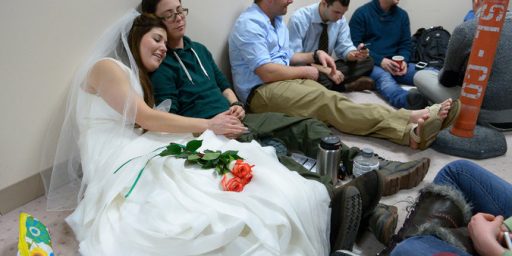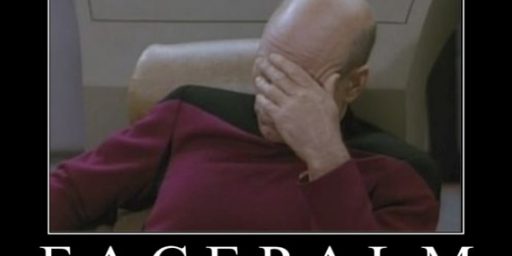California Supremes Halt Gay Marriages
The California Supreme Court on Thursday ordered an immediate halt to gay marriages in San Francisco, delivering a victory to conservatives who have fought for a month to block the ceremonies. Meanwhile, Massachusetts lawmakers reconvened Thursday to consider a ban on gay marriage. They gave preliminary approval to a proposal that would ban gay marriage but allow civil unions.
The California court did not rule on the legality of such marriages, and justices said they would hear such a case in May or June.
Michael Demmons says this means equality is not the order of the day in California. BoiFromTroy thinks so, too, but thought the action inevitable.
It seems clear to me that, regardless of one’s view of gay marriage, this decision was correct, albeit rather late. California voters overwhelmingly voted to ban gay marriages in a recent referendum; the courts need to rule on the constitutionality of that ban. In the meantime, though, it’s outrageous for a chief executive officer to openly flout the law. And given that one can make a very plausible case that the gay marriage ban will survive constitutional muster, the greater harm would be in allowing people to get “married” only to have that union retroactively annuled down the road. It’s far better to presume the law is valid until it’s declared otherwise.
Update: BFT challenges my interpretation of Prop. 22. I respond in his comments.






From Equality California (not exactly a non-biased source on the issue, I admit):
http://www.eqca.org/press/releases/ pr_022704_courtstay.shtml
“In 1999, Attorney General Lockyer refused Pete Knight’s request to title Proposition 22 the ‘definition of marriage’. At that time, the Attorney General successfully argued in court that the initiative should be titled “limitation on marriage” because it dealt only with marriages from other states. There is no justification for citing Proposition 22 to attack marriages enacted within California”
From the same source: “In his request to the state supreme court, the Attorney General appeared to argue that permitting same-sex couples to marry conflicts with Family Code Section 308.5, which was established by Proposition 22, as well as Family Code Section 300, which defines who may marry in California.”
Section 300 already defines marriage as between a man and a woman. So, marriage was already banned and by an overwhelming margin, the voters chose to protected that definition with Prop 22.
California Family Code:
300. Marriage is a personal relation arising out of a civil contract between a man and a woman, to which the consent of the parties capable of making that contract is necessary. Consent alone does not constitute marriage. Consent must be followed by the issuance of a license and solemnization as authorized by this division, except as provided by Section 425 and Part 4 (commencing with Section 500).
301. An unmarried male of the age of 18 years or older, and an unmarried female of the age of 18 years or older, and not otherwise disqualified, are capable of consenting to and consummating marriage.
302. An unmarried male or female under the age of 18 years is capable of consenting to and consummating marriage if each of the following documents is filed with the county clerk issuing the marriage license:
As I noted in Boi’s comments, the notion that Prop 22 doesn’t mean what it says is not only untenable as a matter of statutory interpretation, it also creates a new constitutional problem where none existed before. If a state allows gay marriages performed in-state, there is no policy justification for refusing to recognize gay marriages performed elsewhere.
Paste of my post (on BoiFromTroy) on the fairly overreaching conclusion that the Court actually ruled that the proposition only applied to out of state marriages:
Sorry, there is no PERIOD about it.
Superior Court judge James T. Ford simply upheld the Attorney General’s DECISION to rename of Prop 22 to “Limit On Marriage Initiative”. Citing it was a fair and accurate name.
By no means, anywhere in case # 99-CS-02549, did the Judge make a finding of fact or even a tepid endorsement of the underlying claim that it limits ONLY out of state marriages.
Following your line of reasoning to the logical end, it should have been much more accurately named the “Limit On Out of State Marriage Initiative”.
I suggest that you avoid lifting quotes out of obviously slanted press releases which are in turn reading only what they want out of the full court decision.